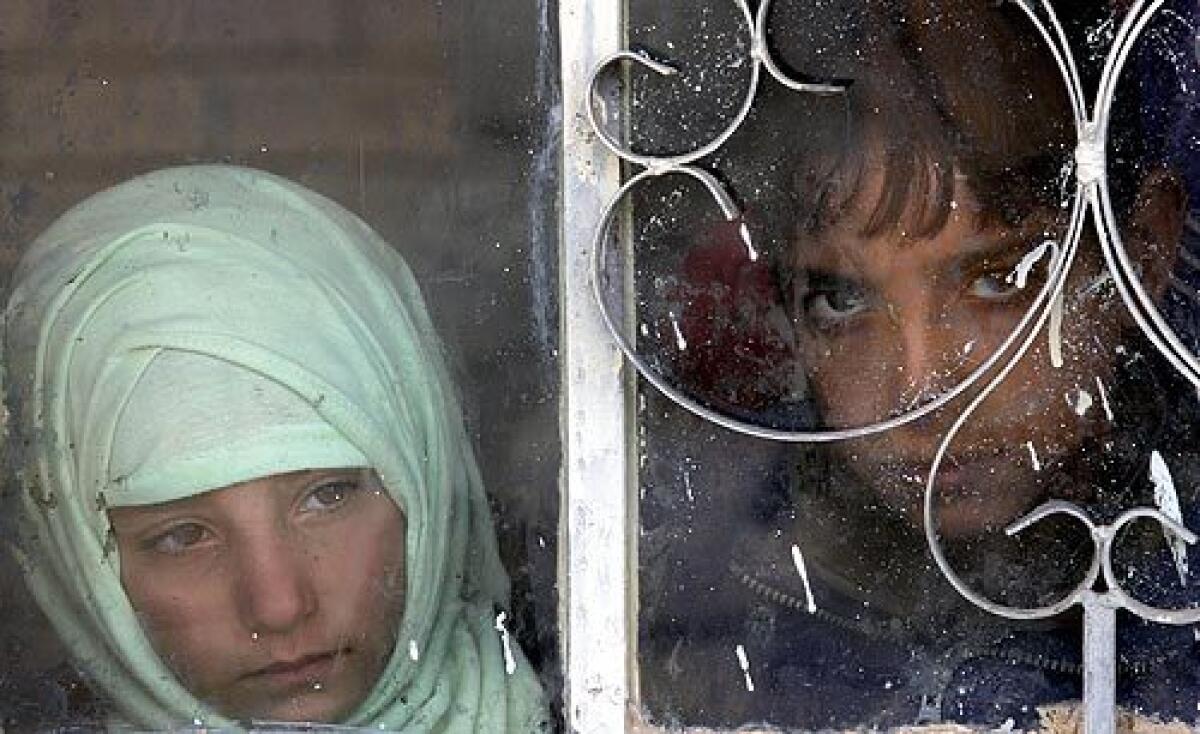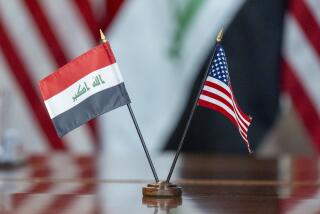U.S. hits targets near Baghdad

U.S. warplanes hammered suspected Sunni militant hide-outs on the southern outskirts of Baghdad on Thursday as part of a wide-ranging military assault on Al Qaeda in Iraq around the country.
American aircraft dropped 49,000 pounds of bombs on the lush farm region of Arab Jabour, said military spokeswoman Maj. Alayne Conway, who called it “one of the largest airstrikes since the onset of the war.”
Most of the bombs were unleashed in a 10-minute flurry during the morning, followed by more strikes through the late afternoon. The targets mainly were deeply buried munitions, Conway said.
The strikes, which involved F-18s, F-16s and B-1 bombers, came on the third day of a new offensive that has U.S. and Iraqi troops hunting down suspected Al Qaeda in Iraq militants and supporters around Baghdad, in eastern Diyala province and the northern provinces of Salahuddin, Al Tamim and Nineveh.
However, the military assault in the Arab Jabour region just south of Baghdad began New Year’s Day.
“We are going after the remaining pockets of resistance” south of the capital, Conway said.
About 90,000 pounds of explosives has been dropped in parts of six provinces across central Iraq in the first 10 days of January, almost double the monthly average for U.S.-led forces in those areas, Conway said.
The U.S. assault on the southern edge of Baghdad follows recent increase in insurgent attacks around the capital.
A spokesman for an Awakening Council -- a volunteer security force -- in the south Baghdad district of Dora said Thursday that civilians had been trapped in the Arab Jabour region by the heavy military activity in recent days.
Alaa Ithawi, the spokesman, said the Americans had told Arab Jabour residents to move 10 days earlier, but not all had done so. He acknowledged that extremists operated in the area, but said the bombings risked alienating more people.
“People are admitting there are gunmen, but to have civilians as targets is a crime against humanity,” Ithawi said.
There was no way to confirm his allegations.
In Diyala province, about 4,000 U.S. and Iraqi soldiers continued Thursday in their search for insurgents in the Diyala River valley, where six U.S. troops and their Iraqi interpreter were killed the previous day when they stepped into a booby-trapped house packed with explosives.
According to intelligence reports, 50 to 60 senior insurgent leaders had been holed up northwest of the town of Muqdadiya, but by the time the offensive began, they had fled.
Soldiers in the Diyala River valley were clearing a village when a resident pointed out “an enemy compound,” said Staff Sgt. Russell Bassett, a spokesman for the 4th Stryker Brigade Combat Team, 2nd Infantry Division.
“He said it was a house that Al Qaeda in Iraq was using,” Bassett said in a telephone interview. “The soldiers asked him if it was booby-trapped. He said no. They went in to clear the house and it exploded on them. It was rigged with crushed wire and multiple drums of homemade explosives.”
The house, which had a “for sale” sign out front, was wired to ensure that it would collapse, Bassett said. The explosives did not go off until the soldiers were well inside, he said.
Military intelligence officers said they did not know whether the resident was an innocent villager or an insurgent intentionally luring the soldiers to the house.
“I don’t know why he did it,” Bassett said. The man, who did enter the home, has been detained.
Soldiers in Diyala have discovered eight improvised explosive devices, three car bombs and 11 weapons caches, and have detained 18 suspected insurgents, Bassett said.
The high-tempo operations around the country come as the U.S. military seeks to land a knockout blow to Al Qaeda in Iraq before the summer, when the U.S. is expected to complete the drawdown of the additional 28,500 troops deployed last year to quell Iraq’s civil war.
In Washington, Defense Secretary Robert M. Gates said the bombing south of Baghdad and military operations in northern Iraq were part of an “important offensive” against militants.
“This job is not finished. There is more to do,” Gates said. “But I think that there is the sense that this is an important offensive, and because we are on the offensive again in areas where we have not been active for some time, it’s not a surprise that we will see some higher casualties until that area’s cleared.”
Gates said he believed that Al Qaeda in Iraq had been largely eliminated from Baghdad and Anbar province, and has been squeezed into northern provinces.
Asked whether the militants were just being pushed out of one area and into another, Gates said commanders in Iraq, including Gen. David H. Petraeus, had anticipated that the insurgents would keep moving. But Gates expressed confidence that insurgents were beginning to run out of areas to flee to.
“Frankly, after these places, there’s not much else -- not many places they can go,” he said.
ned.parker@latimes.comkimi.yoshino@latimes.com
Times staff writers Saif Hameed, Said Rifai and Caesar Ahmed in Baghdad, Alexandra Zavis in Diyala province and Julian E. Barnes in Washington contributed to this report.
More to Read
Sign up for Essential California
The most important California stories and recommendations in your inbox every morning.
You may occasionally receive promotional content from the Los Angeles Times.










